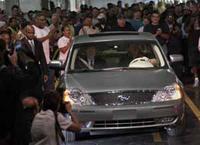Ford is Transforming North American Manufacturing into Flexible Facilities
BIRMINGHAM, Ala., June 30, 2005 -- Ford Motor Company is making record investments in its North American assembly plants, transforming aging factories into lean, flexible and sustainable facilities for the 21st Century.
Matt DeMars, Ford's vice president of North American Vehicle Operations, said the transformation began last year with the opening of the new Dearborn Truck Plant and is picking up pace.
"Ford is in the middle of a manufacturing journey," said DeMars, speaking at the 2005 Automotive News Manufacturing Conference. "We're making record investments in our plants. It started in the spring of 2004 with the grand opening of Dearborn Truck. This plant is the future. It defines sustainable manufacturing and is being studied by industrialists from all over the world."
Plant Investments
This year, Michigan Truck Plant in Wayne adds a new flexible body shop, Kansas City Assembly Plant adds production of the Mercury Mariner Hybrid and AutoAlliance International facility in Flat Rock, Mich., launched the Ford Mustang convertible.
Hermosillo Stamping and Assembly Plant in Sonora, Mexico, and Oakville (Ontario) Assembly Complex also are undergoing retooling and renovation for flexible manufacturing. Later this year, Hermosillo will launch the all-new Ford Fusion, Mercury Milan and Lincoln Zephyr.
Last year, Ford launched Ford Five Hundred, Ford Freestyle and Mercury Montego at Chicago Assembly Plant, which was completely renovated and retooled for flexible manufacturing.
"Our oldest operating assembly plant now has the latest technology," DeMars said. "In Chicago, we're building vehicles that are beating expectations right out of the gate. In last month's J.D. Power survey, the Five Hundred ranked among the top three vehicles in the full-size car segment."
And less than a half-mile away is the Chicago Manufacturing Campus. Twelve suppliers are manufacturing, sequencing and delivering parts and components to the assembly line for those three vehicles.
"With the new flexible systems installed in these plants -- and more coming -- Ford is ready for the future," DeMars said. "In fact, we can't wait."
Mass production high-volume with limited product mix is being replaced by flexible manufacturing systems that respond quickly and efficiently to changing customer demands.
Virtual Build Process
"The company that invented the moving assembly line is again at the forefront of what can only be described as the next manufacturing revolution," DeMars said. "At Ford, before we ever set foot on the plant floor with tooling and installations for a new model program, we're building vehicles in a totally digital environment."
DeMars said Ford is a leader in the Virtual Build Process. "Our product designers and manufacturing engineers work together with our suppliers and plant personnel to assemble an entire vehicle on a computer screen long before the hardware comes out," he said.
Virtual build produces improved quality and ergonomics while reducing time and cost.
The virtual build process was used in the complete development of the Fusion, Milan and Zephyr.
Environmental Advances
"Another area where we're making great stride is in our commitment to the environment. By the end of this year, we will launch a robust internal process that will drive a standardized and sustainable approach to regulatory compliance," DeMars said. "We're not satisfied when our manufacturing processes merely meet the letter of the law. We know we can do better. In many instances, we're already doing it.
"Since 2000, water consumption at our North American manufacturing plants has decreased by more than 16 percent, resulting in a $5 million savings for the business."
At Michigan Truck, Ford is installing a Fumes-to-Fuel technology. Volatile organic compounds from the paint shop will be turned into electricity to power parts of the plant.
The technology was tested successfully last month.
"This fall, we'll flip the switch on the fumes-to-fuel system and help power Michigan Truck using emissions from our paint shop, something we've had to collect and incinerate in the past," he said. "Here again, we're doing something good for the environment and good for the business."
Flexible Manufacturing
Ford Motor Company's flexible manufacturing systems have the ability to build up to eight different models off two independent platforms.
"Our new systems standardize the assembly process, improves productivity, eliminates waste and boosts quality," DeMars said.
Another benefit from flexible manufacturing is greater stability.
By the end of the decade in North America, 75 percent of Ford's body shops, paint, trim and final assembly operations will be flexible.
"Over time, we expect to save up to $2 billion dollars because flexible systems cost 10 to 15 percent less than traditional systems, with an added 50 percent savings in changeover costs," DeMars said.
Supplier Parks
Ford works closely with its suppliers to receive quality components and sub-assemblies in sequence and just-in-time.
"With our focus on getting the product that the customer wants out the door, everything needs to come together at just the right time and in the right place," DeMars said. "It's like one big waltz."
"This is why we've found it beneficial to have our suppliers located as close to our plants as possible." The Chicago Manufacturing Campus, which houses 12 major automotive suppliers, provides 60 percent of Chicago's inventory with just-in-time deliveries.
The reduced inventory and transportation costs flow through to Ford, the suppliers and ultimately, to customers.
"Parks like this work because the relationship we have with our suppliers is mutually beneficial. They have a tremendous impact on the quality, delivery and cost of vehicles," said DeMars.



